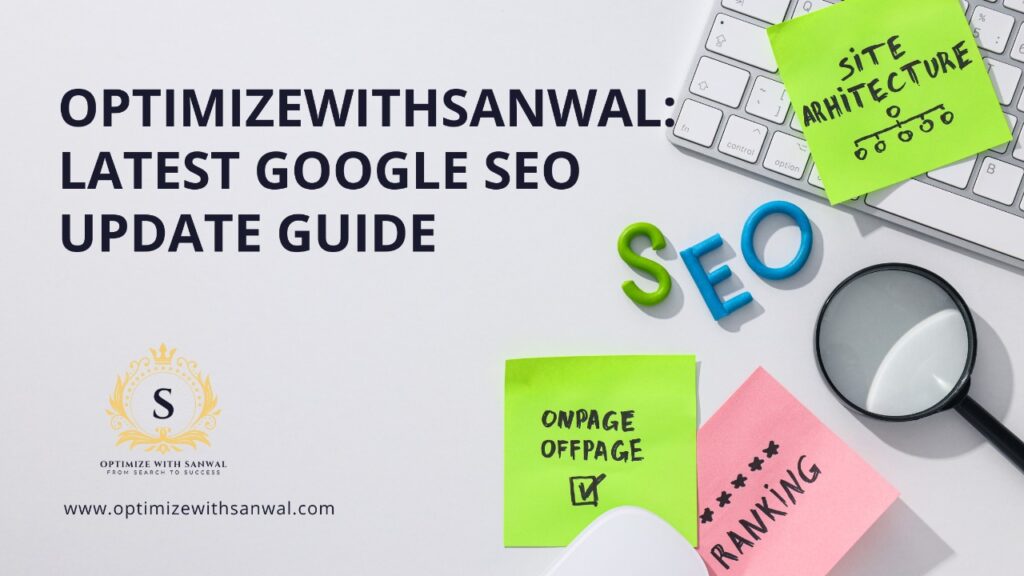Latest Google SEO Update Explained: What It Means for Your Rankings
For Startup Founders Exploring AI Trends in SEO
Introduction
Artificial intelligence is transforming how businesses operate, and search engine optimization (SEO) is no exception. Google’s latest Google SEO update centers on AI-driven advancements that influence how search results are ranked and displayed. For startup founders, understanding these changes is crucial—not only for your marketing strategy but for the overall visibility and growth of your business online.
At OptimizeWithSanwal, we recognize that SEO is no longer just about keywords and backlinks. The evolving Google algorithm now emphasizes user intent, content quality, and real-time user engagement. This update marks a shift towards deeper machine learning models that assess relevance with greater nuance.
In this comprehensive guide, you will learn what the update involves, how AI shapes Google’s ranking signals, and practical steps your startup can take to adapt effectively. At the end, you’ll also find a way to get your free SEO audit from OptimizeWithSanwal, designed to identify opportunities and risks specific to your website.
1. What Is the Latest Google SEO Update?
1.1 Background of the Update
Google continuously evolves its search algorithm to deliver better, more relevant results. The latest Google SEO update, rolled out in mid-2025, is distinctive because of its integration of advanced AI models and user behavior signals. Officially announced on Google’s Webmaster Central blog, this update focuses on improving how Google understands content context and quality through machine learning.
1.2 Core Changes Introduced
The update introduces several important changes:
- Enhanced entity recognition: Google better connects entities such as brands, people, products, and concepts to improve search relevance.
- Contextual understanding: AI-powered natural language processing (NLP) allows Google to interpret user queries and content with greater nuance.
- User experience metrics: Core Web Vitals, mobile usability, and engagement signals now weigh more heavily in determining relevance.
- Real-time learning: Google adjusts rankings dynamically based on live user interactions, such as bounce rates and dwell time.
These changes mean that the latest google seo update is less about exact keyword matches and more about comprehensive content that satisfies user intent and provides a positive experience.
2. Why Google Leaned Into AI This Time
2.1 The Role of AI in Modern Search
Google has incorporated AI into its algorithms for years, beginning with RankBrain and evolving through BERT and MUM. However, the latest update leverages even more sophisticated models capable of understanding context and intent at an unprecedented level. This allows Google to return results that better match the user’s question rather than just the keywords.
2.2 Changing User Behavior
Today’s searchers expect quick, accurate answers. They use natural, conversational language and want search engines to anticipate their needs. This update reflects Google’s response to those expectations by prioritizing content that is helpful, comprehensive, and easy to understand.
2.3 Technical Advancements Behind the Scenes
The update incorporates real-time machine learning models that analyze not only static page factors but also dynamic user engagement data. This includes metrics like scroll depth and repeat visits, which feed into ranking algorithms to evaluate content quality.
2.4 Continuous Improvement with Real-Time Data
Google can now quickly adjust rankings based on fresh data, enabling faster identification of high-quality content and demotion of pages that fail to engage users effectively. This means your website’s performance must be consistently strong to maintain and improve rankings.
3. How the Google Latest Algorithm for SEO Impacts Rankings
3.1 Increased Volatility in Search Results
Since the update, many startups and businesses have noticed fluctuations in rankings. Traditional SEO tactics like keyword density remain relevant but are no longer sufficient on their own. Google rewards content that demonstrates clear topical authority and matches search intent.
3.2 Importance of Entity Recognition
Google now excels at understanding entities mentioned in your content. For startups, this translates into:
- Maintaining consistent brand naming across all online assets
- Using structured data to mark up products, services, and company information
- Building internal links that reinforce entity relationships within your website
3.3 Greater Emphasis on Featured Snippets and Rich Results
The update favors pages that provide direct, concise answers and demonstrate a broad understanding of topics. Startups should aim to create content that can be featured in snippets, “People Also Ask” boxes, and other rich search features.
3.4 Technical SEO’s Expanded Role
Technical factors like site speed, mobile usability, and secure browsing (HTTPS) now contribute more directly to relevance. A slow or poorly designed website can harm rankings even if your content is strong.
4. Practical Implications for Your Startup
4.1 Content Strategy for the AI Era
- Develop topic clusters: Create a central hub of content around core themes relevant to your startup and branch into detailed subtopics. This demonstrates authority and helps Google understand your site structure.
- Use semantic keyword research: Employ tools that identify related phrases, user questions, and concepts around your primary keywords to guide content creation.
- Write conversationally: Address users’ questions naturally, optimizing for voice search and long-tail queries.
4.2 On-Page SEO Best Practices
- Use descriptive headings that mirror user search intent.
- Add schema markup (FAQ, HowTo, Product) to help search engines understand your content context.
- Improve readability by breaking content into digestible paragraphs, using bullet points, and simple language.
4.3 Technical SEO Priorities
- Monitor and improve Core Web Vitals scores (Largest Contentful Paint, Cumulative Layout Shift, First Input Delay).
- Implement responsive design and optimize mobile user experience.
- Ensure efficient crawlability and accurate sitemaps to help Google index your pages effectively.
4.4 Building Backlink Quality and Trust
- Focus on acquiring backlinks from authoritative, relevant websites.
- Engage in guest posting, partnerships, and PR efforts to increase your startup’s online reputation.
- Display trust signals on your site such as testimonials, certifications, and media mentions.
5. AI Tools and Tactics That Help
5.1 Keyword and Topic Discovery
Leverage AI-powered tools like MarketMuse, Surfer SEO, or Clearscope to find user intent clusters and semantic keyword relationships. These tools help you build content that aligns with the latest algorithm’s emphasis on topic comprehensiveness.
5.2 Content Optimization
Use AI to assist in drafting outlines, generating summaries, or testing readability. However, always ensure human review to maintain brand voice and authenticity.
5.3 Schema Markup Automation
Consider plugins or services that dynamically generate schema markup based on your content. Valid schema helps Google display rich results, which can increase CTR and ranking.
5.4 Monitoring and Analytics
Set up dashboards in Google Search Console, Data Studio, or third-party platforms to track ranking fluctuations, user behavior metrics, and rich result performance. This ongoing monitoring is critical to respond quickly to algorithm changes.
6. Step-by-Step Action Plan from OptimizeWithSanwal
Step 1: Perform a Comprehensive SEO Audit
- Evaluate site speed and Core Web Vitals on mobile and desktop.
- Review current keyword rankings for priority terms.
- Analyze content structure for entity mentions and topic clusters.
Step 2: Refine Content and Keyword Strategy
- Create pillar pages covering key startup challenges and AI SEO trends.
- Develop supporting content addressing user questions and related topics.
- Optimize internal linking to strengthen entity signals.
Step 3: Implement Technical SEO Fixes
- Optimize images and enable lazy loading to improve speed.
- Validate and enhance schema markup on all relevant pages.
- Ensure mobile responsiveness and crawl efficiency.
Step 4: Content Launch and Promotion
- Publish new content with clear CTAs guiding visitors to conversion.
- Secure backlinks through outreach to relevant startup and tech blogs.
- Monitor performance closely for ranking changes or engagement shifts.
Step 5: Quarterly Review and Adjustment
- Reassess technical performance metrics and user engagement.
- Update content to reflect new AI trends and industry changes.
- Adjust SEO tactics based on data insights and Google announcements.
7. Common Pitfalls and How to Avoid Them
Overdependence on AI for Content Creation
AI tools can speed up drafting but lack strategic nuance. Always refine AI-generated content to ensure clarity, originality, and alignment with your brand voice.
Ignoring User Intent
Focus on answering the actual questions users ask, not just repeating keywords. Content that matches intent performs better in rankings and user satisfaction.
Keyword Stuffing and Over-Optimization
The latest Google update penalizes unnatural keyword usage. Prioritize natural writing and topic relevance instead.
Neglecting Technical SEO
Even well-written content can falter if your site loads slowly or is difficult to navigate. Regular technical audits are essential.
Conclusion
Google’s latest Google SEO update marks a significant evolution in how search results are determined. AI-driven understanding of content, user intent, and real-time engagement now shape rankings more than ever before. For startups, adapting your SEO strategy to these changes is essential to compete and grow your online presence.
At OptimizeWithSanwal, we specialize in seo services helping startups navigate these complex updates. Our detailed SEO audits and tailored strategies empower you to align your website with Google’s new standards and maximize your ranking potential.
Get Your Free SEO Audit today and let OptimizeWithSanwal help you stay ahead of the curve.

